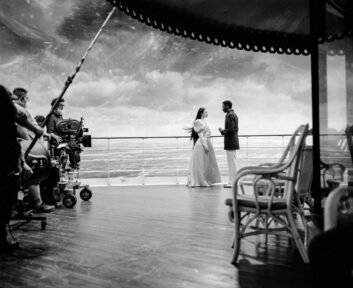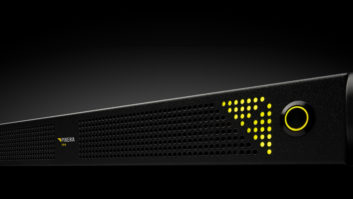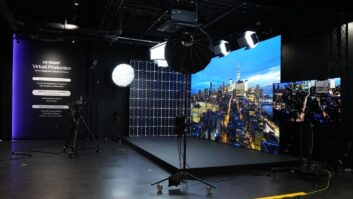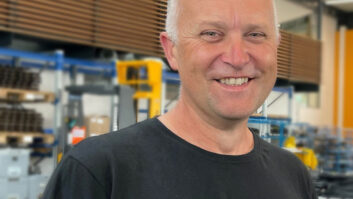The climactic moments of Poor Things, the smash-hit, critically acclaimed gothic comedy movie, nominated for 11 Academy Awards, were brought to life with a mammoth virtual production set-up powered by AV Stumpfl PIXERA technology.
A cinematic tour de force directed by Yorgos Lanthimos (The Lobster, The Favourite) and starring Emma Stone as Bella Baxter, a young woman in Victorian London brought back to life by the brilliant scientist Dr Godwin Baxter (Willem Dafoe), Poor Things premiered at the 2023 Venice International Film Festival, where it won the coveted Golden Lion, and has since garnered 11 Oscar nominations, including the Academy Award for best picture. It also won two Golden Globes and five BAFTAs, including the awards for best special visual effects and best production design.
Key to the creation of much of the visual splendour behind Poor Things’ awards-season success was a state-of-the-art virtual production rig utilising no less than 2,400 individual LED cabinets, with content rendered in 4K (1,536px × 3,840px output per processor) at 10-bit/24fps by four custom-built, PIXERA ONE media servers.
Overseen by the film’s virtual production supervisor/operator, Adrian Weber, the huge virtual production stage comprised 600m² (60m × 10m) of INFiLED INTI 2.6mm LED wall, along with more than 1,500 amplifiers (outputting a peak power of 360kW) and 5.5km of cabling. This gargantuan set-up, weighing more than 21 tonnes, was constructed around the physical set representing the steamship on which Bella embarks on her journey of discovery from Lisbon in the company of debauched lawyer Duncan Wedderburn (Mark Ruffalo).
 “For everything that was filmed on the big ship, the background was done with PIXERA,” with the remainder of the film shot on traditional sets, confirmed Weber. “It was a massive studio build – a full two-floor ship complete with furniture, paintings and everything… it was incredible! That whole part was shot on the stage in front of the LED. There was a lot of glass, a shiny floor, lots of reflections – everything that’s [usually] a bit tricky. The result was that you felt really immersed in the world of the film.”
“For everything that was filmed on the big ship, the background was done with PIXERA,” with the remainder of the film shot on traditional sets, confirmed Weber. “It was a massive studio build – a full two-floor ship complete with furniture, paintings and everything… it was incredible! That whole part was shot on the stage in front of the LED. There was a lot of glass, a shiny floor, lots of reflections – everything that’s [usually] a bit tricky. The result was that you felt really immersed in the world of the film.”
Poor Things’ virtual production stage was constructed by ICT AG and HALOSTAGE at Origo Studios in Budapest, Hungary, where the production was based. The LED wall’s total resolution was a staggering 23K (23,040px × 3840px), meaning the background content had to be rendered in four sections, one per PIXERA ONE server.
It was the first time Weber had used PIXERA, and he had to learn fast, since both PIXERA operators – Michael Schüller and Mario Meszarits – got Covid in the middle of the shoot.
However, Weber soon got to grips with the technology, helped by the intuitiveness that has fast made PIXERA the go-to hardware and software for those working in high-end virtual production and XR environments.
“Although it was quite an intense experience for me to get up to speed, PIXERA’s user-friendly interface helped me to use the system easily and made it very clear to me what I was working on,” he said. “Of course, I’d also done a lot of postproduction before, so many of the features – timelines, layer stacking, live previews, resource distribution – were already very familiar to me.
“The second biggest factor was the support provided by AV Stumpfl. Benni [Müller], Olli [Kilian] and the whole team were constantly available for us right from the start – I can’t tell you how helpful it is to have an actual person on the other end of the phone who will talk you through any challenges.”
Production on Poor Things wrapped up at the end of 2021, with the virtual production shoot having taken under four weeks to complete.
Since finishing work on Poor Things, Weber has used PIXERA “tons of times” on other projects, he says, including all 2D film work with HALOSTAGE and several live events. In addition to its complete feature set, ease of use and dedicated support by AV Stumpfl, he was also impressed by the speed with which the PIXERA software is updated. “In the end, it was both software and service that made an absolute difference,” he concluded.
The 96th Academy Awards (Oscars) ceremony takes place on 10 March at the Dolby Theatre in Hollywood. Poor Things is nominated for 11 awards: best picture, best director (Lanthimos), best actress (Stone), best supporting actor (Ruffalo), best adapted screenplay, best original score, best production design, best cinematography, best make-up and hairstyling, best costume design and best film editing.






